My EPIC day in the Drakensberg, the highest mountain range in southern Africa involved two of my favourite things: monkeys and mountains! As a bonus, I even got to visit an authentic Zulu Village.
Table of Contents
My trip to the Drakensberg, South Africa, was multifaceted, to say the least. There was hiking, monkeys (can’t say which a preferred) and a visit to a real Zulu village. Overlooking the area is Cathedral Peak which is a start point for many hikers local and international. The area is just full of things to explore, so that’s just what we did.
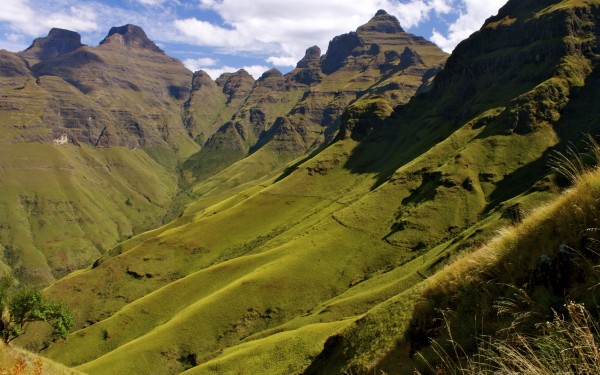
Hiking to the Orange Peel Gap
Our visit to the Drakensberg started with a hike to Orange Peel Gap, in the shadow of Cathedral Peak. The views on this hike are some of the best I have ever seen. It wasn’t easy though. I wanted to turn around and quit.
By the end, I am tired and dehydrated. The hike felt harder than it really was. I persevered. Not even the odd cobra darting in front of my path deterred me and I’m petrified of snakes. One of the reasons I love hiking so much is that it parallels life in a lot of ways. Sure it’s easy to give up, but then you aren’t going to get the sense of accomplishment (and the gorgeous view when hiking).
If you give up every time you get tired, or there’s a tough patch, chances are you’re probably not going to accomplish much of anything – when hiking or in life.
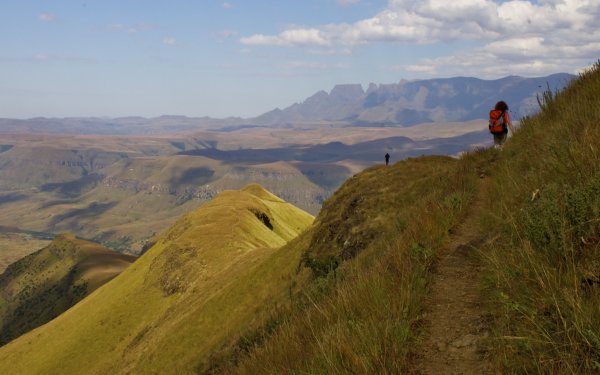
The Views from the Orange Peel Gap
I wearily pressed on for several hours. Each step I took, no matter how slow, or how small, was getting me closer to my goal of reaching Orange Peel Gap.
Eventually, I made it. Our guide is disappointed that we reach two hours later than expected. Nevertheless, I got there. Better late than never! My efforts are rewarded with a view over the UNESCO-designated Drakensberg.
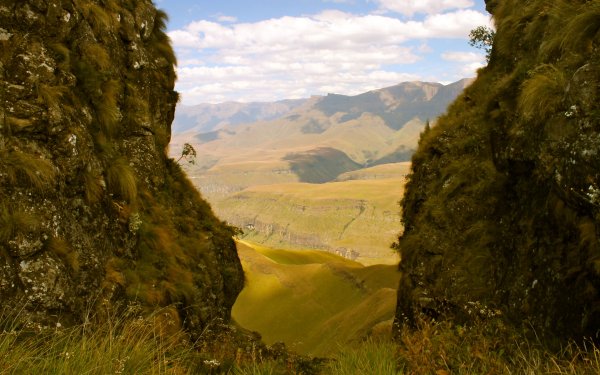
I was proud of myself. Not so much for hiking to Orange Peel Gap as I’ve done tons of hikes that were longer or more strenuous, but for preserving, for not giving up even when I didn’t think I could make it.
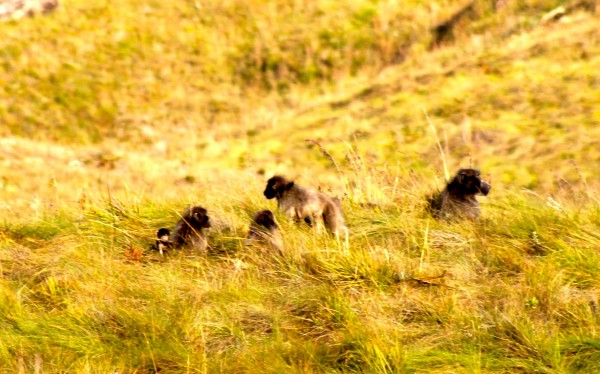
Related Reading: Hippo Tours at iSimangaliso Wetland Park: What You Need to Know
The Wild Baboons of the Drakensberg
Driving back to Didima Chalets at Cathedral Peak, where we were staying, we came across a troop of baboons, including a baby baboon. Just hanging out, foraging, being baboons. I was in heaven.
I am fascinated by primates (and even hold a B.Sc in Primatology – the study of primates) and can watch them for hours, especially when they’re in their natural habitats.
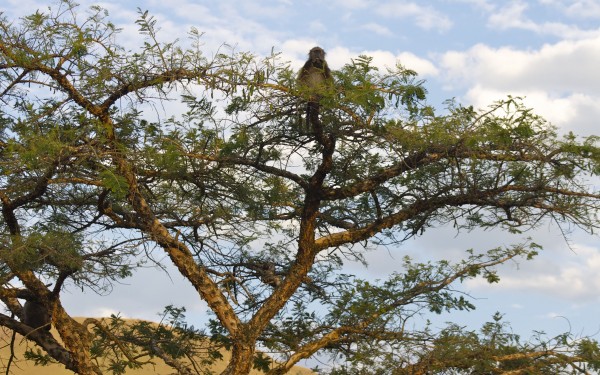 As we exited the van, our guide noticed more baboons hanging out around the chalets. Our group snapped a couple of photos then headed back to their rooms for a much-needed shower, but missing out on a baby baboon temper tantrum.
As we exited the van, our guide noticed more baboons hanging out around the chalets. Our group snapped a couple of photos then headed back to their rooms for a much-needed shower, but missing out on a baby baboon temper tantrum.
I stayed alone observing them until finally, all I could make out in the darkening light were shadows of the few remaining baboons, the rest having headed to the mountains for the night.
It was the perfect time to give a silent thank you to the cobras whose paths I crossed earlier that day for not paying attention to me.
Encountering them has made me a little less fearful of snakes. Finally, I said a thank you to the Drakensberg. You showed me what I was really made of and what I’m capable of when I persevere.
Hiking the Drakensberg Amphitheater
The hike up to the Amphitheater in the Drakensberg is not the most challenging hike in the area but after the gruelling hike to Orange Peel Gap the previous day it was great to do one that was easier.
The Drakensberg Amphitheater is located near Tugela Falls, the second-highest waterfall in South Africa. There is also a great choice in hiking trails, one for each of your visits.
Unless of course, I wanted to choose a more difficult option. I looked up at the high imposing sandstone cliffs where the S. African border meets the Lesotho border and immediately declined. We had planned a 12km ish hike with less than 400m elevation gain and that sounded just fine by me.
Child’s play by hiking standards, but with views that far surpassed the amount of work I did for them. I wasn’t going to complain.
Related Reading: Curious Onlookers: The Samango Monkeys of iSimangaliso Wetland Park
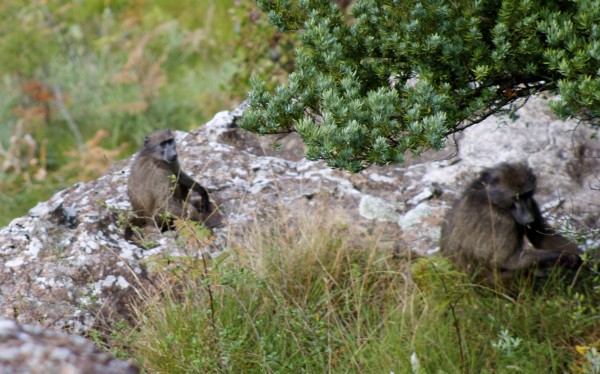
Nor was I complaining when a female baboon and her youngster joined us nearby for lunch. Only in South. Africa would I have lunch with a baboon family.
I lingered over my bagged lunch on a rocky outcrop longer than necessary but enjoying the company of my new-found friends. Even if the mother had much more interest in looking for her lunch than she did in me. At least her youngster seemed just as curious about me as I was about him. We embarked in a staring contest. I think he won.
Related Reading: The Best Places to Visit in South Africa For Wildlife
Tugela Falls: The Worlds Second Highest Waterfall
We continued on until we reached a river valley, that is often flooded in spring, but was almost bone dry given that winter was approaching.
Now the real fun began, a wall ladder and a short scramble for a look at Tugela Falls. Thomas warned us to keep our expectations in check since it was fall and the runoff was likely to be low.
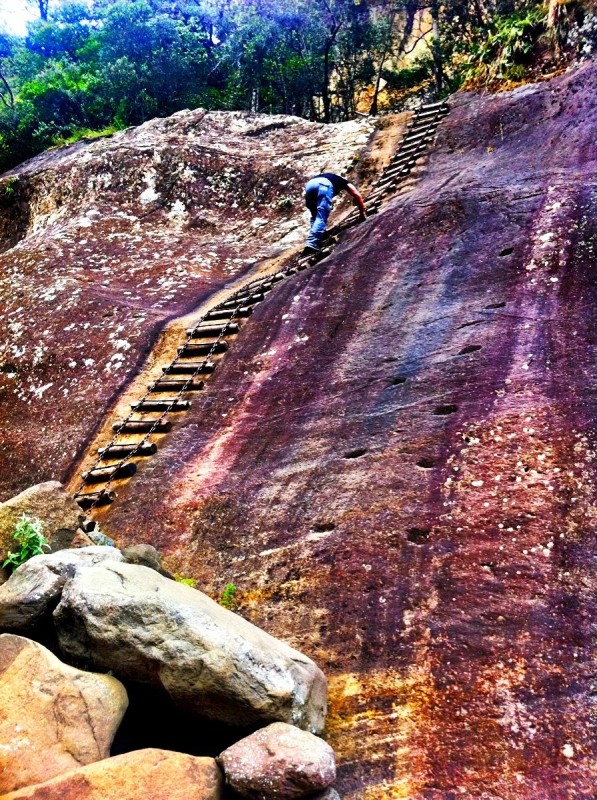 Still, I quickened my pace. I love waterfalls and was expecting something similar to Marmore’s Falls, the world’s largest man-made waterfall in Umbria. Instead, this is what I saw:
Still, I quickened my pace. I love waterfalls and was expecting something similar to Marmore’s Falls, the world’s largest man-made waterfall in Umbria. Instead, this is what I saw:
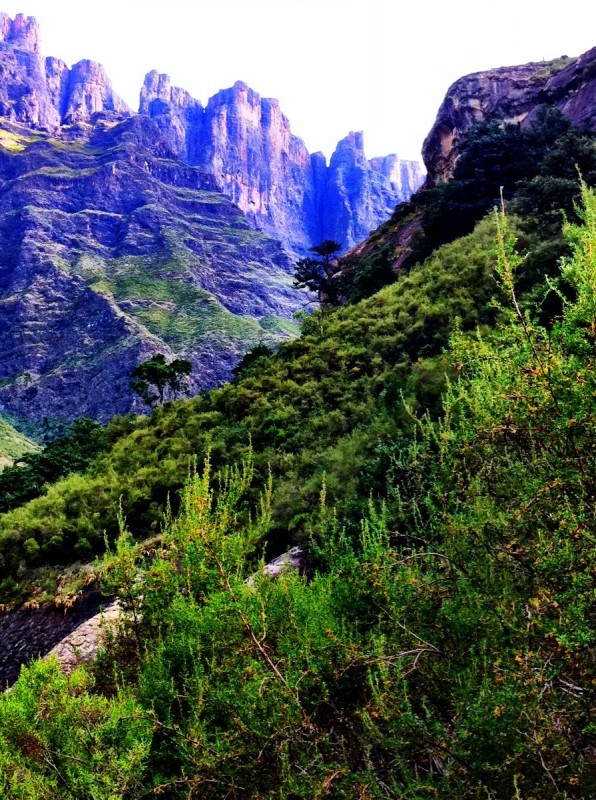
In place of the waterfall was a cliff where the waterfall would be, come springtime. In fall it completely eluded us, not even offering a dribble. Waterfalls can be so fickle!
Related Reading: Adventures in a Zulu Village, South Africa
Visitor Information for Drakensberg Amphitheater
We stayed at the Thendele Chalets, which offers self-catered chalets in the shadows of the Drakensberg Amphitheater. It’s a great place to stay if you love the idea of nature on your doorstep.
One morning around 6:00 am I dreamed that I heard baboons calling. Much to my dismay, I later found out that they had been just outside my door. Now I really regretted not getting up. One never knows what adventures are waiting for you in S. Africa, and sometimes it’s literally just outside your front door!
You can also stay at the Witsieshoek Mountain Lodge which comes highly recommended and offers you spectacular views of the mountains. There’s an onsite restaurant that serves meals throughout the day and you just 45 minutes away from Gold Gate Highlands National Park.
Know Before You Go Hiking the Drakensberg Amphitheater:
- The best time to go hiking in the Drakensberg according to our guides is in April and May, which is fall. Temperatures are cooler, but not too cool and except for the Easter weekend, it’s not likely to be overrun with tourists.
- The Drakensberg receives snow in winter (June – August). Hiking is still possible, but check the weather conditions before you go so that you bring the appropriate clothing.
- Contact the South Africa Tourism Site (in German) or the South African Tourism Site (in English) for more info on hiking and accommodations in the Drakensberg.
Exploring a Zulu Village
Our next stop on our trip through the Drakensberg was an authentic Zulu village.
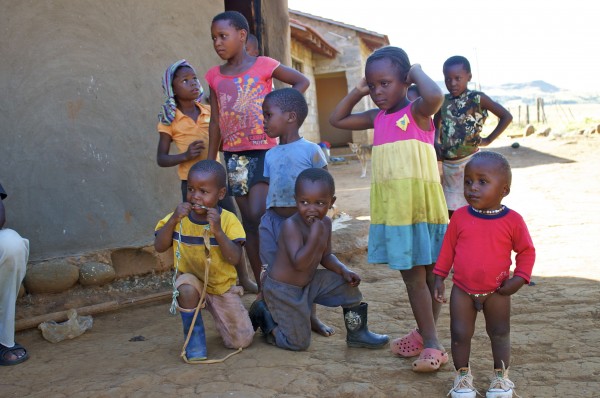
“I’m very excited that my village is getting electricity at the end of the month,” proclaimed Eric, our Zulu guide as he proudly showed us around his Zulu village in the Drakensberg in the shadow of Cathedral Peak.
I am shocked. Only a few houses in the village have electricity. When I asked what he was most looking forward to about electricity he didn’t hesitate to answer “A refrigerator, so that I can eat more meat. Now I only eat meat a couple of times a month when I go into town, but I have to eat it quickly before it spoils.”
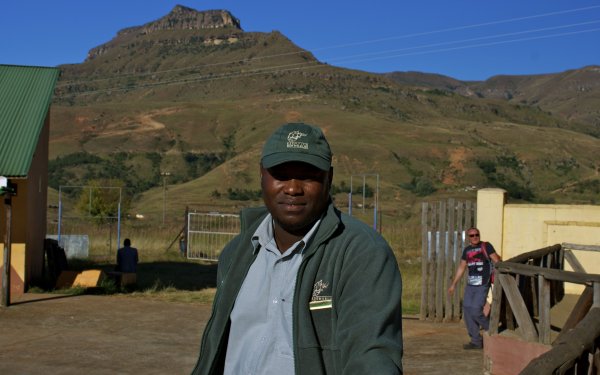
Related Reading: Whale Watching in St Lucia, South Africa
The next day I met his brother Wiseman and posed the same question to him. Despite living in the same house as his brother Eric, his answer was completely different, “A T.V. so that I watch more football (that’s soccer to N. Americans).”
This brief encounter had me asking myself, What would I look forward to most about having electricity? and What else could I learn from the Zulu way of life?
What Life is Like in a Zulu Village
If you lived in a Zulu village you would probably spend most of your free time playing football if you were a boy. Girls are allowed to play. Usually, they choose not to though.
Here, in the shadows of Cathedral Hill, kids enjoy their time outdoors. I suppose it has something to do with the natural beauty of the place and the fact that they do not have luxuries such as the internet which we take for granted.
Related Reading: Visit Durban: Experience The Top Places to Visit in Durban
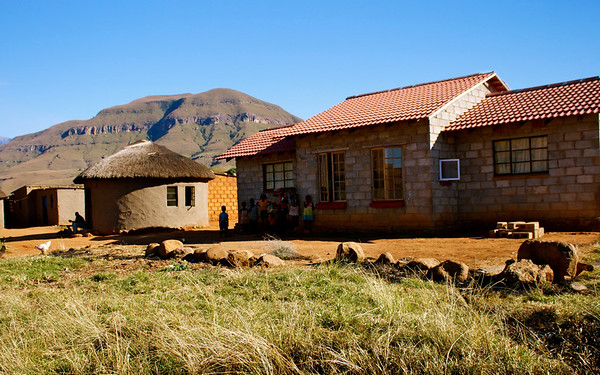
Here in the village, you have to pay your wife to be’s father 11 cows before you can get married. I’m not making this up. Wiseman has two children with his girlfriend from another village 90km away. He is unable to live with her until they marry.
They cannot marry until he provides her family with 11 cows. When asked if it was negotiable he thought for a moment, chewing his lip. “Yes, I could marry her if I had 8 cows, and would then have another year to get the remaining 3 cows, but I don’t have 8 cows. Cows are expensive.”
A line of credit so to speak. “Would you like to marry your girlfriend?” I inquired. “Yes of course. Now I have to cook for myself and wash my own clothes. When I come home from work I am tired and don’t feel like doing this.”.
I’m waiting for the punchline. There isn’t any.
Related Reading: Curious Onlookers: The Samango Monkeys of iSimangaliso Wetland Park
Family Life in a Zulu Village
Wiseman explained to me that in Zulu culture married men and women have clear roles – the man works and provides a living for his family, while the woman takes care of the household. Shocked by my surprise, he asks if my husband helps around the house.
“Yes, I replied, he does all the laundry, I do all the cooking and we share the cleaning.” He looked at me in disbelief, shaking his head as he muttered something under his breath. Clearly, he thinks there is something wrong with this.
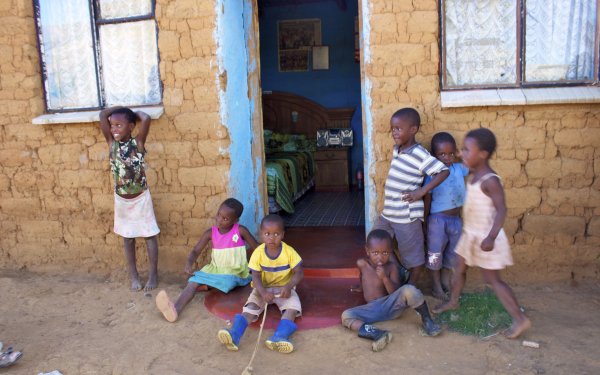
Despite their distinctive roles, men do play an active role in parenting. After my previous conversation with Wiseman, I might not have believed this had I not seen it with my own eyes.
Eric’s youngest of four children run up to him in too big running shoes for a hug. He clings to Eric as he shows us around his village. Eric’s son cried miserably when it was time for Eric to leave. Absolutely heartwarming!
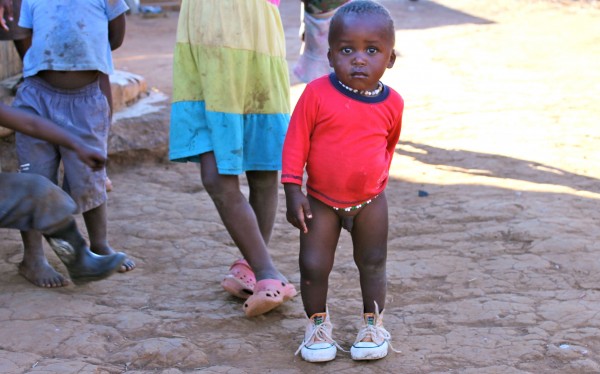
If you lived in a Zulu village you may not know what an “earthquake” was. Eric explained that since you would likely not have experienced one, and didn’t own a TV or have internet, you may not have ever seen one. Eric tells me that this is where his village splits. Some residents are interested in international news. They seek out information. Other residents do not.
But without electricity seeking out information was not as easy as it is for most of us. Despite the information divide, most Zulu speak more languages than most North Americans do. Eric and Wiseman both spoke four languages, their native Zulu, Afrikaans, English and another local language, putting me to shame in the language department.
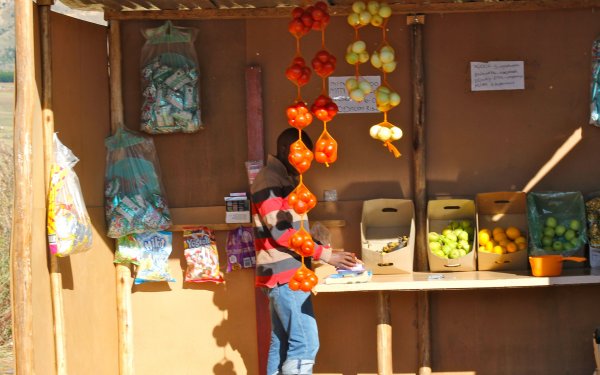
What I Learnt
If you lived in a Zulu village you wouldn’t (gasp and unthinkable to me) find baboons fascinating, since a troop of baboons can be destructive in the garden and your home, if they get in.
Both Eric and Wiseman were proud to be Zulu and couldn’t imagine living anywhere else. They loved their close-knit community and they seemed happy.
A week later back at home, I’m still pondering the electricity question. It’s not easy to answer something that I’ve taken completely for granted my entire life. I’m grateful for my adventures in a Zulu village that made me ask the question in the first place – and for my husband’s help around the house!
Related Reading: African Adventures.
What You Need to Know Before You Go to the Drakensberg
We stayed in the nearby lovely and spacious Didma Chalets which are only a short drive from the Zulu Village. Inquire there or see the official South Africa Tourism Site (in German) or the South African Tourism Site (in English) for more info on how to arrange a tour of a Zulu village in the Drakensberg.
You can also stay at the Cathedral Peak Hotel which is a 4-Star which offers you guided hikes and bird watching tours. The hotel is also in a great location to check out other points of interest in the region. If your visiting as a family this hotel is great as it has several play areas and a babysitting service.
Cathedral Peak is located ~4 hours from Johannesburg and ~3 hours from Durban.
The best times to visit the area are between February and April, in the fall time as the weather is great and there is not much chance of rainfall.
